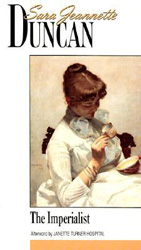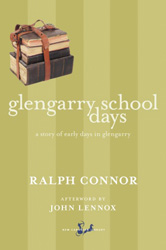 Book 42, The Man From Glengarry (1901) – Ralph Connor
Book 42, The Man From Glengarry (1901) – Ralph Connor
“Ranald Macdonald’s roots are in the forest of Ontario’s easternmost county and his character was forged in the small Presbyterian church near his home. When he leaves to test his idealism and faith in the rough world of the lumber business, he brings pride to the minister’s wife who was the model for his life.
Met with international acclaim when published in 1901, The Man From Glengarry is a tale of courage and an exciting portrait of life in 19th-century Canada.”
Other useful links:
the Wikipedia entry for Ralph Connor
My thoughts:
My response to this book was variable. It can be summed up thusly:
(Loooong) First Act: A sermon, a funeral, a conversion, a Christian “revival”: Tedious, painful torture. One star.
Second Act: A young man and his friends being young people in Quebec City: Great fun, enjoyable. Eight stars.
Third Act: A young man establishing himself in his career (and his love life) and single-handedly making sure Confederation with BC did not turn into a disaster: Good, but not developed enough: Six stars.
Here are the comments I made as I read it (beware spoilers ahead):
@Chapter 3
The description of Mrs. Murray is a little over the top. She’s like a living saint and gets her angel’s wings by sacrificing her own needs and intellectual stimulation to obediently serve her husband and his parishioners, a good servant of the Christian patriarchy. The description reminded me a bit of Marmee in Little Women.
I peeked ahead to read the afterword, to find out whether Alison Gordon mentions her or not, and discovered that Mrs. Murray is modelled after Ralph Connor’s mother. Ahh. No wonder she’s so perfect and idealised in her role. Apparently, there’s another female character who’s more independent coming up.
When Maimie realized that the service was really over, she felt as if she had been in church for a week.
So did I by the time I finished reading about it!
I did my Honours thesis on eighteenth century sermons, so either my patience for this kind of thing has thinned considerably or this treacly Christianity is, for some reason more difficult to bear for me.
@Chapter 8
It is very difficult for me to wrap my head around the concept that the danger of fire is just nature being itself (i.e. “don’t get too close, the wind blows out the flames”), Ranald actually saves Maimie from injury by his quick action, but all the credit goes to God, that they all have to stand around and pray to. In my book, if God is responsible for sparing the girl injury, he’s responsible for putting her in danger. If the fire acts as a result of physics, it’s human intervention that saves her and it’s Ranald and he alone who deserves praise. (In fact, I take door number 2). This worldview where God is responsible for “miracles” or good events and nature or accident or humans are responsible for the danger and the suffering that takes place makes no sense whatsoever (201 people die in plane crash. Miracle child survives!).
Oh, and this one stuck out at me:
But his wife [Mrs. Murray] came to the table with a sweeter serenity than usual, and a calm upon her face that told of hidden strength.
Um. Mrs. Murray is already portrayed as a saint upon the earth (or perhaps she walks just above it). How can she possibly be even better on Sundays? LOL.
I had to take a short break from this to read something else. I like Ranald and the clan, but I can take only so much preaching. A church chapter followed by a funeral chapter was just a bit too much. Started back up now. Oh my gawd is this the most tiresome book I’ve read in ages. All I can do is think about how much torture it would entail to live under such pious tedium. An eighteen month religious revival? What a waste of time and energy!! And all the moaning and wailing about sin and forgiveness…blah blah blah. I feel so sorry for the people who had to spend their lives like this—half the time in a panic over whether they or their loved ones would end up in a lake of fire for all eternity and the other half singing psalms and praising the god who would put them there.
I’m hoping that the book will actually have a plot eventually.
@Chapter 17
Yes! I’m through The Gauntlet of Religious Zeal™. The rest of the book looks pretty good—kind of a typical ‘love quadrangle’ (or pentagon?) shaping up. On the boys;’ side we have Ranald, Harry, and De Lacey, on the girls’, Maimie and Kate. Who will end up with whom? Only thing we can know for sure is that Maimie and Harry won’t be partnered off.
The last act of the book is a breath of fresh air. Echoes of Armand Durand with the man from the country rising up in the world. It’s rather fun hanging out with the young people in Quebec City: a bit of drinking, a bit of gambling, a bit of fighting in the street, a bit of courting, a bit of canoeing. Lots of great characters, none of them unlikeable. And Kate is quite the modern gal, more at home driving a feisty team of horses than corseted up for sermons and tea.
Finished. The final third of the book was really like reading a different novel. I wish that Connor had toned down and shortened the sermonizing sections and expanded on Ranald’s experiences in British Columbia. We know why he went there but not why and how he became so attached.
Of course, the nation-building theme is quite obvious there at the end.
Ranald and Mrs. Murray are much too idealised, both by the author and by the other characters. They’re both utterly competent to any situation, and neither have any failings. People just aren’t that perfect. And would we really want them to be?
 Book 45, The Imperialist (1904) – Sara Jeannette Duncan
Book 45, The Imperialist (1904) – Sara Jeannette Duncan

